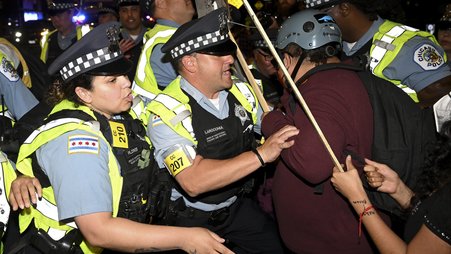
U.S./Mexico border
Laws that don’t directly target the press often pose hidden threats to First Amendment freedoms. That’s why Freedom of the Press Foundation (FPF) and a group of press freedom organizations filed a brief urging the Supreme Court to confirm the unconstitutionality of a law prohibiting “encouraging” or “inducing” unlawful immigration.
The case is called United States v. Hansen. It did not involve a journalist — the defendant ran an adoption agency accused of promising people citizenship to lure them across the border. But the law’s prohibitions are so broad they could enable prosecution of everyone from editorialists calling for more permissive immigration policies to investigative journalists exposing lapses in border security. It’s blatantly unconstitutional and has already been abused to monitor and interrogate journalists reporting on the 2018 “caravan” of migrants to the U.S.
That’s bad enough, but a ruling for the government in the Hansen case could also have serious repercussions for journalism outside the immigration context. For one, it could open the door to prosecutions of journalists for publishing truthful, newsworthy reporting.
If a news report can be deemed illegal for giving migrants ideas on how to cross the border, why can’t the same reasoning apply to, say, criticism of police departments that exposes incompetences that criminals might exploit? What about reporting of abuses that might lead protesters to trespass on government property, or stay out past curfews?
Sure, any convictions would likely be struck down as unconstitutional. The Supreme Court has repeatedly held that “state action to punish the publication of truthful information seldom can satisfy constitutional standards” absent a need “of the highest order,” although the court has declined to categorically pronounce that true reporting can never be punished.
But that doesn’t mean prosecutors won’t try. The mere prospect of arrest would surely encourage self-censorship. And that’s not the only risk.
A bad decision in Henson could also facilitate prosecution of routine newsgathering, including under the Espionage Act, by setting a precedent at the Supreme Court level that journalists may be prosecuted for the actions of others.
The 2001 Supreme Court case Bartnicki v. Vopper made clear that journalists cannot be punished for publishing records their sources obtained unlawfully, even when journalists have reason to know how their sources got the information. But at least one federal appellate circuit has held that, despite Bartnicki, journalists may be prosecuted when the law makes mere “obtainment” of the documents a crime in and of itself.
A ruling for the government in Hansen could allow prosecutors to further circumvent Bartnicki by charging journalists for “encouraging” sources to break the law (for example, by illegally recording conversations or leaking documents). Journalistic practices as common as asking government employees for information, or providing a means to transmit leaked records confidentiality, could theoretically suffice for an indictment.
It’s a boundary the government is already testing in its Espionage Act prosecution of Julian Assange, under the theory that he broke the law by receiving and publishing stolen documents that he did not himself steal. A ruling for the government in Hansen could embolden prosecutors to continue their pursuit of Assange and bring similar charges elsewhere.
Argument in the case is scheduled for March 27. Anyone interested in press freedom should pay close attention given what’s at stake. Any ruling striking down the law would be a win for the press, but an opinion that makes clear that Congress cannot legislate around the Bartnicki rule could be a game changer. It could cement Constitutional protections for common journalistic practices and rebuke prosecutors’ constant efforts to criminalize them.
The brief was written by Professor Penny Venetis, Director of the International Human Rights Clinic at Rutgers Law School, and her students.



